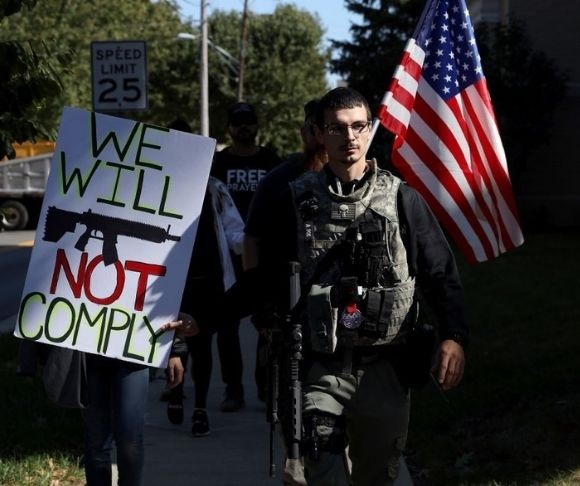The House of Representatives quickly passed a Senate-approved gun control bill 234-193. Fourteen Republicans sided with the Democrats and three didn’t vote at all, but with a left-wing majority in the House, it makes little difference. Staving off this bill would have required Democrats to defect, not Republicans. The legislation must still be signed by the president, but that’s a foregone conclusion. As the old saying goes, it’s all over but the crying. History will record this agreement as bipartisan because of the minority of Republicans who supported it – especially the 15 GOP senators. Under all the unity hype the efforts of the 33 senators who fought against it will go largely unnoticed. So here are the highlights of their efforts, in remembrance of Republican resistance to gun control. Though none of them gained so much consideration as a vote, 11 amendments were filed by four different Republicans in attempts to mitigate the constitutional violations and probable ineffectiveness of this Act.
Sen. Rand Paul (R-KY) publicly promised to try to amend the bill, and he stood out as the one to make the most attempts. Over the course of seven failed amendments, SA5109 to SA5115, Paul tried to fix the enhanced background checks of gun buyers under 21 so that only actual violent crimes – specifically assault, murder, rape, domestic abuse, and animal cruelty – could be a disqualifying offense (SA5109). He also attempted to require a background check to specify precisely what the disqualifying offense was (SA5109), and he ordered an annual report to Congress detailing the demographic information – including race, ethnicity, national origin, sex, age, disability, average annual income, and English language proficiency, if available – of anyone determined ineligible to make such a purchase based on a NICS background check (SA5112).
Paul made several efforts at addressing constitutional concerns of so-called red-flag laws, all to no avail. These weren’t heavy asks, either. He wanted to do away with “ex parte” hearings (SA5115) and require the accused be allowed a defense before even the initial emergency order (SA5111). One of Paul’s amendments would have increased the standard of proof for an extreme risk protection order to “beyond a reasonable doubt,” which is the standard one must meet to convict someone of a crime in America (SA5113). Another would have prohibited anonymous accusations from being acted upon (SA5114). One other Paul amendment would have stricken language in the bill that prohibits the use of certain federal school funds for weapons or weapon training for teachers and staff (SA5110).
 Sen. Steve Daines (R-MT) proposed an amendment to add in a Second Amendment expansion rather than address the infringements in the rest of the bill. He tried to slip in national reciprocity for concealed carry permits, which would have required every state in the Union to allow anyone licensed in another state to carry concealed (SA5104). Sen. Mike Lee (R-UT) introduced two amendments that never got a vote. Simply put, SA5117 would have stricken the entire section that establishes a red-flag slush fund and SA5118 would have done the same for the section that, as Democrats put it, “closes the boyfriend loophole” by expanding the list of prohibited persons at the federal level.
Sen. Steve Daines (R-MT) proposed an amendment to add in a Second Amendment expansion rather than address the infringements in the rest of the bill. He tried to slip in national reciprocity for concealed carry permits, which would have required every state in the Union to allow anyone licensed in another state to carry concealed (SA5104). Sen. Mike Lee (R-UT) introduced two amendments that never got a vote. Simply put, SA5117 would have stricken the entire section that establishes a red-flag slush fund and SA5118 would have done the same for the section that, as Democrats put it, “closes the boyfriend loophole” by expanding the list of prohibited persons at the federal level.
Sen. Ted Cruz (R-TX), on the other hand, tried to replace the entire text of the bill with one crafted by himself and Sen. John Barrasso (R-WY). The Cruz-Barrasso bill, titled “Safe Kids, Safe Schools, Safe Communities Act of 2022,” focused on punishing criminals and protecting the vulnerable rather than disarming everyone else. And that is, perhaps, the best summary of the nature of the gun control debate: Who’s to blame for the violence, the criminals who commit the vile acts or everyone else?
As the law changes, and as the societal perception of right and wrong inevitably shifts to match it, never forget that there was a resistance to this redefining of the right to keep and bear arms – infringement of the right, if we don’t sugar coat it. Only 15 Senate Republicans out of 50 supported this bill, along with just 14 out of 210 GOP representatives. Just as there was a time before the National Firearms Act of 1934 and the Gun Control Act of 1968 – 146 and 180 years, respectively – when the definition of the Second Amendment was considerably different, so too will there forever be these last 234 years before this most recent change.




